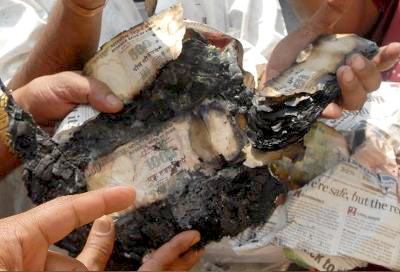New Delhi, Apr 16: Minority Affairs Minister Mukhtar Abbas Naqvi on Thursday directed state waqf boards to ensure strict implementation of lockdown and social distancing guidelines during the holy month of Ramzan starting next week amid the coronavirus pandemic.
At a meeting via video conferencing, Naqvi asked the state waqf boards' officials to create awareness among people to offer prayers and perform other religious rituals like "iftar (breaking of fast)" during Ramzan, which begins on April 24 or 25, staying inside their homes.
More than seven lakh registered mosques, eidgahs, imambadas, dargahs and other religious and social institutions come under state waqf boards across the country. The Central Waqf Council is the regulatory body of state waqf boards in India.
"We should cooperate with health workers, security forces, administrative officers, sanitation workers. They are working for our safety and well-being even putting their own lives at risk in this coronavirus pandemic," Naqvi said.
"We should also demolish rumours and misinformation being spread about quarantine and isolation centres by creating awareness among people that such centres are only meant to protect people, their families and the society from the pandemic," the minister said.
Naqvi told all the state waqf boards and religious and social organisations that everyone should remain cautious of any type of fake news and conspiracies aimed at creating misinformation.
"Authorities have been working for safety and well-being of all citizens of the country without any discrimination. Such type of rumours and conspiracies are a nefarious design to weaken the fight against coronavirus," he said.
"We should work united to win this fight against corona by defeating any type of rumour, misinformation and conspiracy," the minister said.
Naqvi asked officials of all the state waqf boards to play an active and effective role in ensuring that people follow the guidelines of the Union Home Ministry, state governments and the Central Waqf Council while fulfilling religious responsibilities during Ramzan.
In view of the challenges of the COVID-19 pandemic, all religious and social activities and mass gatherings in all the temples, gurdwaras, churches and other religious and social places of the country have been stopped, he said.
Similarly, any mass gatherings in mosques and other Muslim religious places of the country has also been stopped, Naqvi said.
He said that due to the COVID-19 threat, religious leaders as well as religious and social organisations from all regions of the country, have appealed to people to offer prayers and perform all other religious rituals staying inside their homes during Ramzan.
Most of the Muslim nations of the world have also banned mass gatherings at mosques and other religious places during the holy month, he pointed out.
Prime Minister Narendra Modi, in cooperation with all the state governments, has been working effectively for the safety and well-being of the people, he said.
The cooperation of the people has brought great relief to India in the war against COVID-19 Naqvi said, adding that several challenges are still there before the country.
"We can defeat these challenges of the coronavirus pandemic by following all the guidelines of the central and state governments strictly," he asserted.
Chairman and senior officials from state waqf boards such as Uttar Pradesh (Shia & Sunni), Andhra Pradesh, Bihar (Shia & Sunni), Dadra & Nagar Haveli, Haryana, Karnataka, Kerala, Madhya Pradesh, Punjab, West Bengal, Andaman & Nicobar, Assam, Manipur, among others participated in the meeting.
State waqf boards from Rajasthan, Telangana, Delhi, Chhattisgarh, Gujarat, Himachal Pradesh, Jammu and Kashmir, Jharkhand, Maharashtra, Odisha, Puducherry, Tamil Nadu, Tripura and Uttarakhand also participated.
 Informed sources said the burnt currency notes were reportedly brought in sacks and then dumped by workers of a company on Parsa Kheda road at C B Ganj in Bareilly.
Informed sources said the burnt currency notes were reportedly brought in sacks and then dumped by workers of a company on Parsa Kheda road at C B Ganj in Bareilly.




Comments
Ha ha naren ....
Dear nothing happened...people are cool ...if khujlee...the majority of Indians are your brothers......Bhai relax.....no fools will burn notes till the last moment.......tax officials and auditors are giving plans to escape....burning is Bjps naatak...anyhow RSS was informed before and the changed Chaddeez to Pants with the black money they had......because khujlee was not....
hahaha faizhal bhai ... black money yella settle ment jora ? ... burnol business jora ? itch guard business thumba joranthe howda ...
looks like it is counterfiet currency , so they burnt , behind we can make out which area is that ... hahaha ... this area is dominted by one particular community ... so this type of things are expected as they got frustrated ... papa ISI handlers are at loss ...
Foolish BJP people just want to show public....see people started throwing away black money...ha ha....they are good in fooling their bhakts who are having the jai jai mantra..
Foolish people .... why to burn the currency .... Deposit 2 laks in each persons account and make it white .... Each family of 5 members can help to convert 10 laks black money in to white .... Instead of burning, donate to the poor people / relatives and advice them to deposit in their bank accounts .... 2 laks per person .... in this way, your headache is gone ... Indians got white funds and poor people / relatives are benefited .... So many benefits with one master stoke ... Naren, Bupa, kaisa hai idea ....
Should have distributed amongst poor people around....
Add new comment